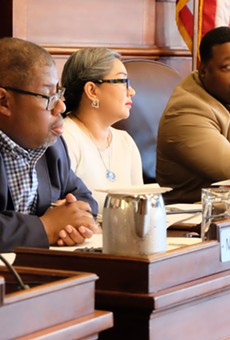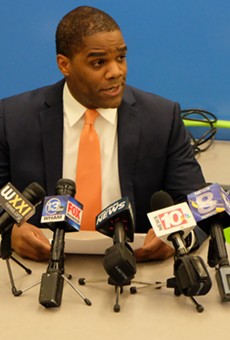The Rochester City School District is facing perhaps one of the most serious crises it has had in recent history: Its leaders just learned that it has significantly overspent its 2018-2019 budget and the school board and administration are scrambling to find answers as the district’s critics pile on.
Several days have passed since the discrepancy was found by an external auditor. But on Monday, school officials were no closer to providing any answers:
But Dade may have to revise those plans depending on where the investigation leads and the amount of overspending that’s uncovered.
The district’s crisis drew a chorus of sharp criticisms. Responding to appeals from local leaders, a spokesperson for State Comptroller Tom Dinapoli said auditors from his office will examine the school district's finances.
House Representative Joe Morelle sent a letter to US Attorney General William Barr asking for an investigation into the matter. Morelle, speaking to local media, referred to Distinguished Educator Jaime Aquino’s report and his warnings about the district’s financial problems. And he called the situation a civil rights issue since the majority of the district’s students are children of color.
Morelle was not alone. County Executive candidate Adam Bello, a Democrat, agreed with Morelle’s call for a Department of Justice investigation and he called on the state to create a control board “to intervene, straighten out the finances, ensure our children receive the education they deserve, and protect taxpayers.”
And State Assembly member Harry Bronson asked State Comptroller Tom DiNapoli to audit and investigate the district.
Mayor Lovely Warren also had a forceful response. Monday, Warren announced that she wants state officials to "sever the connection" between city government and the Rochester school district, a change that would require the district to raise its own funds. City government provides a little over $119 million of the district's nearly $1 billion budget.
Currently, school districts in New York’s largest cities — Rochester is one of them — do not have the authority to raise funds through property taxes the way suburban and rural districts do. The urban districts depend on city governments to approve their budgets and collect taxes to help pay for their expenses.The city school districts receive most of their funding from state and federal governments and from grants.
If the state legislature and the governor agree to Warren's request, the district would become fiscally independent and would have its own taxing authority. Voters would have to approve the district's budget each year. This would present a huge challenge for a city like Rochester, which has a high poverty rate and a limited tax base.
The district’s financial team has been pouring over data. Board president Van White says that there are two areas that may have led to the shortfall: mandated improvements in the district's special education services and increases in health insurance costs.
Superintendent Barbara Deane-Williams led the district during the budget year in question. Deane-Williams left in January of this year and Interim Superintendent Daniel Lowengard was left to hammer out the 2019-2020 budget. Long-time board member Willa Powell, who chairs the board’s finance committee, says the committee meets quarterly but they get monthly financial statements. However, they don’t always get accurate updates for May and June because some vendor invoices come in after the June 30 end of the fiscal year, Powell says.
“And we don’t learn about that until around now,” she says. Powell says whatever the shortfall turns out to be, it will have to be reconciled in this year’s budget.
During this year’s budget deliberations, Interim Superintendent Lowengard warned board members that the district’s spending was exceeding its revenue, something that was pointed out earlier by Distinguished Educator Aquino in his report. Powell says board members understood this was something the board needed to work on.
But during that same time period board members were acting under a false assumption that the prior year’s budget was balanced. In a May 14, 2019 special board meeting, Everton Sewell, the district’s chief financial officer told board members the 2018-2019 budget was on track to be balanced at the end of the year, according to minutes from the meeting.
Over the weekend, board member Beatriz LeBron broke with her peers and squarely placed the blame on her fellow board members, specifically White and Powell. In a statement to the media, she said that former superintendent Deane-Williams, board president White, and Powell ignored her warning about “spending well into this fiscal year.”
LeBron, who chairs the audit committee, asked for White to step down as president and Powell to step down as chair of the financial committee.
Many things about the crisis, even after several days, remain surprisingly unclear. For instance, where are shortfalls coming from? Are they the result of overspending across the board or in specific departments?
Why has it taken the administration days to review a budget that was supposed to be balanced? Why did the district recently borrow $50 million from the city and what was that money for?
White said last week that the administration would give a full-accounting of the matter on October 8, but the pressure to get answers is building rapidly. And so are concerns about accountability. As unpleasant as it may be, it will be difficult to avoid consequences.
White said he is not averse to accountability, including a control board. “At this point, all options are on the table,” he said.
Several days have passed since the discrepancy was found by an external auditor. But on Monday, school officials were no closer to providing any answers:
- They say they still don’t know how much the district overspent, though the Democrat and Chronicle reported that it “was likely in the range of $50 million.”
- They say they don’t know how it will affect students, teachers, and programs.
- And they say they don’t know how the budget shortfall from 2018-2019 will impact this school year’s budget.
But Dade may have to revise those plans depending on where the investigation leads and the amount of overspending that’s uncovered.
The district’s crisis drew a chorus of sharp criticisms. Responding to appeals from local leaders, a spokesperson for State Comptroller Tom Dinapoli said auditors from his office will examine the school district's finances.
House Representative Joe Morelle sent a letter to US Attorney General William Barr asking for an investigation into the matter. Morelle, speaking to local media, referred to Distinguished Educator Jaime Aquino’s report and his warnings about the district’s financial problems. And he called the situation a civil rights issue since the majority of the district’s students are children of color.
Morelle was not alone. County Executive candidate Adam Bello, a Democrat, agreed with Morelle’s call for a Department of Justice investigation and he called on the state to create a control board “to intervene, straighten out the finances, ensure our children receive the education they deserve, and protect taxpayers.”
And State Assembly member Harry Bronson asked State Comptroller Tom DiNapoli to audit and investigate the district.
Mayor Lovely Warren also had a forceful response. Monday, Warren announced that she wants state officials to "sever the connection" between city government and the Rochester school district, a change that would require the district to raise its own funds. City government provides a little over $119 million of the district's nearly $1 billion budget.
Currently, school districts in New York’s largest cities — Rochester is one of them — do not have the authority to raise funds through property taxes the way suburban and rural districts do. The urban districts depend on city governments to approve their budgets and collect taxes to help pay for their expenses.The city school districts receive most of their funding from state and federal governments and from grants.
If the state legislature and the governor agree to Warren's request, the district would become fiscally independent and would have its own taxing authority. Voters would have to approve the district's budget each year. This would present a huge challenge for a city like Rochester, which has a high poverty rate and a limited tax base.
The district’s financial team has been pouring over data. Board president Van White says that there are two areas that may have led to the shortfall: mandated improvements in the district's special education services and increases in health insurance costs.
Superintendent Barbara Deane-Williams led the district during the budget year in question. Deane-Williams left in January of this year and Interim Superintendent Daniel Lowengard was left to hammer out the 2019-2020 budget. Long-time board member Willa Powell, who chairs the board’s finance committee, says the committee meets quarterly but they get monthly financial statements. However, they don’t always get accurate updates for May and June because some vendor invoices come in after the June 30 end of the fiscal year, Powell says.
“And we don’t learn about that until around now,” she says. Powell says whatever the shortfall turns out to be, it will have to be reconciled in this year’s budget.
During this year’s budget deliberations, Interim Superintendent Lowengard warned board members that the district’s spending was exceeding its revenue, something that was pointed out earlier by Distinguished Educator Aquino in his report. Powell says board members understood this was something the board needed to work on.
But during that same time period board members were acting under a false assumption that the prior year’s budget was balanced. In a May 14, 2019 special board meeting, Everton Sewell, the district’s chief financial officer told board members the 2018-2019 budget was on track to be balanced at the end of the year, according to minutes from the meeting.
Over the weekend, board member Beatriz LeBron broke with her peers and squarely placed the blame on her fellow board members, specifically White and Powell. In a statement to the media, she said that former superintendent Deane-Williams, board president White, and Powell ignored her warning about “spending well into this fiscal year.”
LeBron, who chairs the audit committee, asked for White to step down as president and Powell to step down as chair of the financial committee.
Many things about the crisis, even after several days, remain surprisingly unclear. For instance, where are shortfalls coming from? Are they the result of overspending across the board or in specific departments?
Why has it taken the administration days to review a budget that was supposed to be balanced? Why did the district recently borrow $50 million from the city and what was that money for?
White said last week that the administration would give a full-accounting of the matter on October 8, but the pressure to get answers is building rapidly. And so are concerns about accountability. As unpleasant as it may be, it will be difficult to avoid consequences.
White said he is not averse to accountability, including a control board. “At this point, all options are on the table,” he said.

